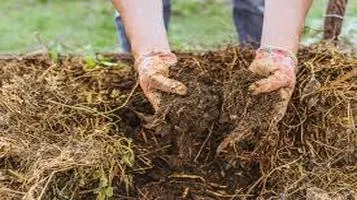Aged Manure: The Unsung Hero of Organic Gardening
Aged manure is a natural, nutrient-rich organic material that has been allowed to decompose over time, making it an excellent soil amendment for gardens and agricultural fields. Unlike fresh manure, which can be too potent and potentially harmful to plants due to high ammonia levels, aged manure has broken down sufficiently to provide a balanced supply of essential nutrients like nitrogen, phosphorus, and potassium. This decomposition process also reduces odors and eliminates pathogens and weed seeds, making it safer and more pleasant to handle. Aged manure improves soil structure, enhances moisture retention, and promotes beneficial microbial activity, leading to healthier plant growth. It is an eco-friendly option for sustainable gardening, contributing to soil fertility while minimizing chemical fertilizer use.

In the realm of organic gardening, where the balance between nurturing the earth and cultivating vibrant plants is paramount, aged manure stands out as an indispensable resource. Over the years, this natural fertilizer has garnered a well-deserved reputation among gardening enthusiasts, landscapers, and farmers alike. Having personally utilized aged manure in various gardening projects, I can confidently attest to its myriad benefits and irreplaceable value. This review delves into the characteristics, advantages, and considerations of using aged manure, aiming to provide a comprehensive overview for both novice and experienced gardeners.
Characteristics of Aged Manure
Aged manure, often referred to as composted manure, is manure that has been allowed to decompose over a period, typically ranging from six months to a year. During this time, the manure undergoes a transformation facilitated by microbial activity, resulting in a nutrient-rich, crumbly, and earthy-smelling product. Unlike fresh manure, which can be pungent and potentially harmful due to high ammonia levels and pathogens, aged manure is more stable, safer, and friendlier to plants.
The nutrient profile of aged manure is one of its most appealing attributes. It is a rich source of essential macronutrients like nitrogen, phosphorus, and potassium, as well as a host of micronutrients such as calcium, magnesium, and sulfur. These nutrients are vital for plant growth, supporting everything from root development to flowering and fruiting. Additionally, aged manure improves soil structure by enhancing its aeration, water retention, and microbial activity, which are crucial for healthy plant growth.
Advantages of Using Aged Manure
1. Enhanced Soil Fertility: One of the primary benefits of aged manure is its ability to enrich soil fertility. The slow-release nature of its nutrients ensures that plants receive a steady supply over time, reducing the risk of nutrient burn and promoting sustained growth. This makes it an excellent choice for long-term soil health and productivity.
2. Improvement of Soil Texture: Aged manure works wonders in improving soil texture. It helps break up heavy clay soils, making them more friable and easier to work with. In sandy soils, it enhances water retention, preventing nutrients from leaching away too quickly. This dual benefit makes aged manure versatile across different soil types.
3. Promotion of Soil Microbial Life: The decomposition process of manure introduces a plethora of beneficial microorganisms into the soil. These microbes play a critical role in breaking down organic matter, fixing nitrogen, and suppressing soil-borne diseases. The result is a more resilient and dynamic soil ecosystem that supports robust plant growth.
4. Environmental Sustainability: Utilizing aged manure is an eco-friendly practice that recycles waste material and reduces the reliance on chemical fertilizers. By opting for this natural fertilizer, gardeners contribute to a more sustainable agricultural system, minimizing pollution and promoting organic cultivation methods.
5. Cost-Effective Solution: Compared to synthetic fertilizers, aged manure is often more cost-effective, especially when sourced locally or from one’s own livestock. This affordability makes it an attractive option for gardeners on a budget without compromising on quality.
Considerations and Best Practices
While aged manure offers numerous benefits, there are some considerations and best practices to keep in mind to maximize its efficacy and avoid potential pitfalls:
1. Source and Quality: The quality of aged manure can vary based on its source. Manure from herbivores like cows, horses, and rabbits is generally preferred over that from omnivores or carnivores due to lower risks of pathogens and contaminants. It’s also essential to ensure that the manure is well-aged and free from weed seeds, as poorly composted manure can introduce unwanted plants to your garden.
2. Application Rates: Applying aged manure in appropriate quantities is crucial. Over-application can lead to nutrient imbalances and potential runoff issues. As a general guideline, incorporating 2-3 inches of aged manure into the top 6-8 inches of soil is a good starting point. For established plants, a thin layer as a top-dressing can provide a nutrient boost without overwhelming the plants.
3. Timing: The timing of manure application can influence its effectiveness. For vegetable gardens, applying aged manure in the fall allows it to integrate into the soil over winter, readying the ground for spring planting. For perennial beds, a spring application can give plants a head start for the growing season.
4. Complementary Practices: Combining aged manure with other organic amendments, such as compost, mulch, and cover crops, can further enhance soil health and plant growth. These practices work synergistically to build a robust and fertile garden ecosystem.
Conclusion
Aged manure is truly the unsung hero of organic gardening. Its ability to improve soil fertility, texture, and microbial life, coupled with its environmental and economic benefits, makes it a valuable asset for any gardener. By understanding its characteristics, benefits, and best practices, gardeners can harness the full potential of aged manure, creating thriving gardens that are both productive and sustainable. Whether you are a seasoned gardener or just starting your journey, incorporating aged manure into your gardening routine is a step towards healthier plants and a healthier planet.






